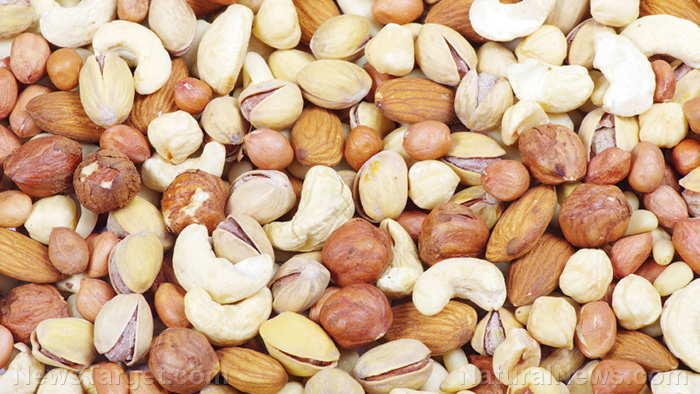Just 2 teaspoons of nuts can stave off cognitive decline in the elderly
12/01/2019 / By Edsel Cook

As people grow older, their cognitive health declines. But a new Australian study suggests that aging people can improve their cognitive function if they eat large amounts of nuts every day.
The researchers surveyed more than 4,800 Chinese adults who were 55 years of age or older for 15 years. They discovered a link between eating more than 10 grams of nuts every day and improved mental ability.
They reported that participants who ate that amount of nuts regularly displayed better memory, reasoning, and thinking.
Dr. Ming Li oversaw the efforts of the University of South Australia (UniSA) research team. He remarked that their findings provided the first evidence of a correlation between cognition and nut intake in aging Chinese adults.
Their findings also offered a potential solution for the increasing number of mental health problems that affected aging populations, such as dementia.
“Population aging is one of the most substantial challenges of the twenty-first century,” explained Li. “Not only are people living longer, but as they age, they require additional health support which is placing unprecedented pressure on aged-care and health services.” (Related: Improve cognitive performance and attention with good fats and nutrition.)
The world’s population of older people is growing rapidly
Li believed that preventative health care might solve the problems faced by an aging population. Adding healthy foods to their diet, for instance, might prove effective in preserving mental health.
Based on the findings of his team, older people might enhance their cognitive function by as much as 60 percent if they eat at least two teaspoons of nuts each day. Daily intake of nuts can help prevent the loss of two year’s worth of cognitive function.
Age-related mental health problems are becoming common in China. The country has one of the fastest-growing populations of aging people in the world.
Experts predict that the population of China will hit its peak at 1.44 billion in 2029. Senior citizens will heavily outnumber younger people by then.
By the time 2050 rolls in, there will be 330 million Chinese who are more than 65 years old. Another 90.4 million will be older than 80. China will have the largest population of elderly people in the world.
China is not the only country that will experience this problem. The World Health Organization (WHO) predicts that the global population of people aged 60 years and above will exceed the world’s number of children less than five years old.
Eating plenty of peanuts every day may help older adults stay independent
Li and his UniSA team evaluated nine sets of data collected by the China Health Nutrition Survey for 22 years. They noticed that 17 percent of the participants regularly ate nuts.
Peanuts made up most of their daily nut intake. Li said that the nut reduced inflammation and displayed antioxidant activity. Both effects helped alleviate and limit the loss of cognitive function.
“Nuts are known to be high in healthy fats, protein and [fiber] with nutritional properties that can lower cholesterol and improve cognitive health,” he noted. “While there is no cure for age-related cognition decline and neurogenerative disease, variations in what people eat are delivering improvements for older people.”
The WHO’s most recent estimate places the global population of dementia patients at 47 million. The number will hit 75 million in 2030 and reach 141 million by 2050.
Unsurprisingly, China contains the highest number of dementia cases in the world.
Li explained that cognition naturally declines during the aging process. Additionally, age contributes to the onset of cognitive diseases.
If eating peanuts and other nuts might help older people preserve their cognitive health, they would be able to maintain independent lifestyles for years to come.
Sources include:
Submit a correction >>
Tagged Under:
aging, Alzheimer's, brain foods, brain function, brain health, brain nutrients, cognition, cognitive function, dementia, longevity, natural cures, nuts, Peanuts
This article may contain statements that reflect the opinion of the author
RECENT NEWS & ARTICLES
Natural.News is a fact-based public education website published by Natural News Features, LLC.
All content copyright © 2018 by Natural News Features, LLC.
Contact Us with Tips or Corrections
All trademarks, registered trademarks and servicemarks mentioned on this site are the property of their respective owners.






















